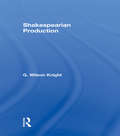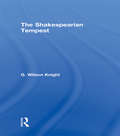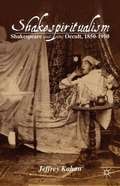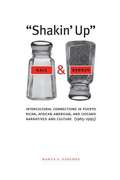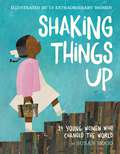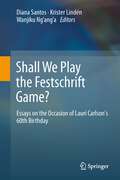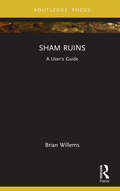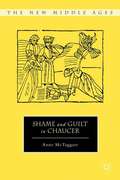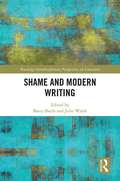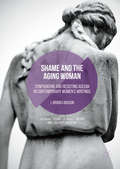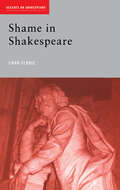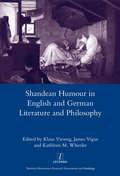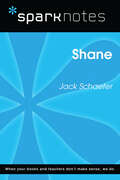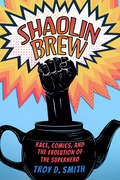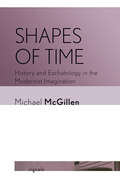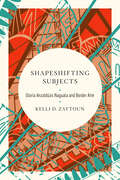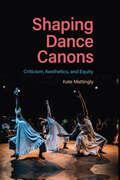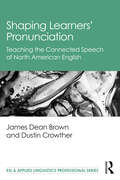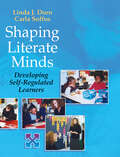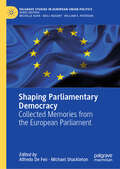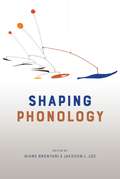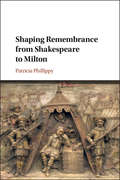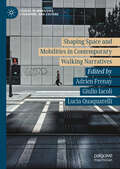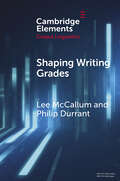- Table View
- List View
Shakespearian Production V 6: With Especial Reference To The Tragedies
by G. Wilson KnightThis part of the G. Wilson Knight collected works, Volume VI looks at his view on Shakespearian production with special reference to the Tragedies.
Shakespearian Tempest - V 2
by G. Wilsin KnightFirst published in 2002. Routledge is an imprint of Taylor & Francis, an informa company.
Shakespiritualism
by Jeffrey KahanThis study concerns itself with a now-forgotten religious group, Spiritualists, and how their ensuing discussions of Shakespeare's meaning, his writing practices, his possible collaborations, and the supposed purity and/or corruption of his texts anticipated, accompanied, or silhouetted similar debates in Shakespeare Studies.
Shakin' Up Race and Gender: Intercultural Connections in Puerto Rican, African American, and Chicano Narratives and Culture (1965-1995)
by Marta Ester SánchezThe second phase of the civil rights movement (1965-1973) was a pivotal period in the development of ethnic groups in the United States. In the years since then, new generations have asked new questions to cast light on this watershed era. No longer is it productive to consider only the differences between ethnic groups; we must also study them in relation to one another and to U.S. mainstream society.<P><P>In "Shakin' Up" Race and Gender, Marta E. Sánchez creates an intercultural frame to study the historical and cultural connections among Puerto Ricans, African Americans, and Chicanos/as since the 1960s. Her frame opens up the black/white binary that dominated the 1960s and 1970s. It reveals the hidden yet real ties that connected ethnics of color and "white" ethnics in a shared intercultural history. By using key literary works published during this time, Sánchez reassesses and refutes the unflattering portrayals of ethnics by three leading intellectuals (Octavio Paz, Daniel Patrick Moynihan, and Oscar Lewis) who wrote about Chicanos, African Americans, and Puerto Ricans. She links their implicit misogyny to the trope of La Malinche from Chicano culture and shows how specific characteristics of this trope--enslavement, alleged betrayal, and cultural negotiation--are also present in African American and Puerto Rican cultures. Sánchez employs the trope to restore the agency denied to these groups. Intercultural contact--encounters between peoples of distinct ethnic groups--is the theme of this book.
Shaking Things Up: 14 Young Women Who Changed the World
by Susan Hood“Each poem and illustration shines with a personality all its own.” —Shelf Awareness (starred review)“This book has definitely made an impact on my life.” —Kitt Shapiro, daughter of Eartha KittFresh, accessible, and inspiring, Shaking Things Up introduces fourteen revolutionary young women—each paired with a noteworthy female artist—to the next generation of activists, trailblazers, and rabble-rousers.From the award-winning author of Ada’s Violin and Lifeboat 12, Susan Hood, this is a poetic and visual celebration of persistent women throughout history.In this book of poems, you will find Mary Anning, who was just thirteen when she unearthed a prehistoric fossil. You’ll meet Ruby Bridges, the brave six-year-old who helped end segregation in the South. And Maya Lin, who at twenty-one won a competition to create a war memorial, and then had to appear before Congress to defend her right to create.And those are just a few of the young women included in this book. Readers will also hear about Molly Williams, Annette Kellerman, Nellie Bly, Pura Belpré, Frida Kahlo, Jacqueline and Eileen Nearne, Frances Moore Lappé, Mae Jemison, Angela Zhang, and Malala Yousafzai—all whose stories will enthrall and inspire. This poetry collection was written, illustrated, edited, and designed by women and includes an author’s note, a timeline, and additional resources.With artwork by award-winning and bestselling artists including Selina Alko, Sophie Blackall, Lisa Brown, Hadley Hooper, Emily Winfield Martin, Oge Mora, Julie Morstad, Sara Palacios, LeUyen Pham, Erin Robinson, Isabel Roxas, Shadra Strickland, and Melissa Sweet.A 2019 Bank Street Best Book of the Year Named to the 2019 Texas Topaz Nonfiction Reading ListSelected for CCBC Choices Book 2019Selected as a Notable Social Studies Trade Books for Young People 2019Named to the Cuyahoga County Public Library’s 2018 list of Great Books for Kids2020-2021 South Carolina Picture Book Award Nominee
Shall We Play the Festschrift Game?
by Krister Lindén Diana Santos Wanjiku Ng’ang’aThere are not many people who can be said to have influenced and impressed researchers in so many disparate areas and language-geographic fields as Lauri Carlson, as is evidenced in the present Festschrift. His insight and acute linguistic sensitivity and linguistic rationality have spawned findings and research work in many areas, from non-standard etymology to hardcore formal linguistics, not forgetting computational areas such as parsing, terminological databases, and, last but not least, machine translation. In addition to his renowned and widely acknowledged insights in tense and aspect and its relationship with nominal quantification, and his ground-breaking work in dialog using game-theoretic machinery, Lauri has in the last fifteen years as Professor of Language Theory and Translation Technology contributed immensely to areas such as translation, terminology and general applications of computational linguistics. The three editors of the present volume have successfully performed doctoral studies under Lauri's supervision, and wish with this volume to pay tribute to his supervision and to his influence in matters associated with research and scientific, linguistic and philosophical inquiry, as well as to his humanity and friendship.
Sham Ruins: A User's Guide (Routledge Focus on Literature)
by Brian WillemsIn the middle of the eigtheenth century, a new fad found its way into the gardens of England's well-to-do: building fake Gothic ruins. Newly constructed castle towers and walls looked like they were already falling apart, even on the first day of their creation. Made of stone, plaster, or even canvas, these "sham ruins" are often considered an embarrassing blip in English architectural history. However, Sham Ruins: A User's Guide expands the specific example of the sham ruin into a general principle to examine the way purposely broken objects can be used to both uncover old truths and invent new ones. Along with architecture, work by Ivan Vladislavić, Tom Stoppard, Alain Mabanckou, Aleksei Fedorchenko, Michael Haneke, and Sturtevant is used to develop this thesis, as well as artifacts such as pre-torn jeans, fake histories, and broken screen apps. Using these examples, one of the key questions the book raises is: what is it that sham ruins ruin? In other words, if real ruins are ruins of what they actually are, then sham ruins should be considered ruins of what they are not. Thus sham ruins are about imposing new meaning where such meaning does not and should not exist. They also can show how things we think are functioning well are actually already broken. Sham ruins do this, and much more, by being lies, ruses, and embarrassments. This is what gives them the power with which we can think about objects in new, unintended ways.
Shame and Guilt in Chaucer
by Anne MctaggartExplores the representation of emotions as psychological concepts and cultural constructs in Geoffrey Chaucer's narrative poetry. McTaggart argues that Chaucer's main works including The Canterbury Tales are united thematically in their positive view of guilt and in their anxiety about the desire for sacrifice and vengeance that shame can provoke.
Shame and Modern Writing (Routledge Interdisciplinary Perspectives on Literature)
by Julie Walsh Barry SheilsShame and Modern Writing seeks to uncover the presence of shame in and across a vast array of modern writing modalities. This interdisciplinary volume includes essays from distinguished and emergent scholars in the Humanities and Social Sciences, and shorter practice-based reflections from poets and clinical writers. It serves as a timely reflection of shame as presented in modern writing, giving added attention to engagements on race, gender, and the question of new media representation.
Shame and the Aging Woman
by J. Brooks BousonThis book brings together the research findings of contemporary feminist age studies scholars, shame theorists, and feminist gerontologists in order to unfurl the affective dynamics of gendered ageism. In her analysis of what she calls "embodied shame," J. Brooks Bouson describes older women's shame about the visible signs of aging and the health and appearance of their bodies as they undergo the normal processes of bodily aging. Examining both fictional and nonfiction works by contemporary North American and British women authors, this book offers a sustained analysis of the various ways that ageism devalues and damages the identities of otherwise psychologically healthy women in our graying culture. Shame theory, as Bouson shows, astutely explains why gendered ageism is so deeply entrenched in our culture and why even aging feminists may succumb to this distressing, but sometimes hidden, cultural affliction.
Shame in Shakespeare (Accents on Shakespeare)
by Ewan FernieOne of the most intense and painful of our human passions, shame is typically seen in contemporary culture as a disability or a disease to be cured. Shakespeare's ultimately positive portrayal of the emotion challenges this view. Drawing on philosophers and theorists of shame, Shame in Shakespeare analyses the shame and humiliation suffered by the tragic hero, providing not only a new approach to Shakespeare but a committed and provocative argument for reclaiming shame.The volume provides:· an account of previous traditions of shame and of the Renaissance context· a thematic map of the rich manifestations of both masculine and feminine shame in Shakespeare· detailed readings of Hamlet, Othello, and King Lear· an analysis of the limitations of Roman shame in Antony and Cleopatra and Coriolanus· a polemical discussion of the fortunes of shame in modern literature after Shakespeare.The book presents a Shakespearean vision of shame as the way to the world outside the self. It establishes the continued vitality and relevance of Shakespeare and offers a fresh and exciting way of seeing his tragedies.
Shandean Humour in English and German Literature and Philosophy
by James Vigus"One of many writers inspired by Laurence Sterne's Tristram Shandy, the German novelist Jean Paul Richter coined the term 'Shandean humour' in his work of aesthetic theory. The essays in this volume investigate how Sterne's humour functions, the reasons for its enduring appeal, and what role it played in identity-construction and in the representation of melancholy. In tracing its hitherto under-recognised impact both on literary writers, such as Jean Paul and Herman Melville, and on philosophers, including Hegel and Marx, the collection reveals that Shandean humour is a Grenzganger - a point of commerce not only between Anglophone and German discourses, but also between literature and philosophy. Klaus Vieweg is Professor of Philosophy at the Friedrich Schiller University of Jena; James Vigus is postdoctoral research fellow at the Department of English and American Studies, Ludwig Maximilian University of Munich; Kathleen M. Wheeler is Reader in English Literature at the University of Cambridge."
Shane (SparkNotes Literature Guide Series)
by SparkNotesShane (SparkNotes Literature Guide) by Jack Schaefer Making the reading experience fun! Created by Harvard students for students everywhere, SparkNotes is a new breed of study guide: smarter, better, faster. Geared to what today's students need to know, SparkNotes provides: *Chapter-by-chapter analysis *Explanations of key themes, motifs, and symbols *A review quiz and essay topicsLively and accessible, these guides are perfect for late-night studying and writing papers
Shaolin Brew: Race, Comics, and the Evolution of the Superhero
by Troy D. SmithShaolin Brew: Race, Comics, and the Evolution of the Superhero looks at how the comic book industry developed from a white perspective and how minority characters were and are viewed through a stereotypical white gaze. Further, the book explores how voices of color have launched a shift in the industry, taking nonwhite characters who were originally viewed through a white lens and situating them outside the framework of whiteness. The financial success of Blaxploitation and Kung Fu films in the early 1970s led to major comics publishers creating, for the first time, Black and Asian superhero characters who headlined their own comics. The introduction of Black and Asian main characters, who previously only served as guest stars or sidekicks, launched a new kind of engagement between comics companies and minority characters and readers. However, scripted as they were by white writers, these characters were mired in stereotypes. Author Troy D. Smith focuses on Asian, Black, and Latinx representation in the comic industry and how it has evolved over the years. Smith explores topics that include Orientalism, whitewashing, Black respectability politics, the model minority myth, and political controversies facing fandoms. In particular, Smith examines how fans take the superheroes they grew up with—such as Luke Cage, Black Lightning, and Shang Chi—and turn them into the characters they wished they had as children. Shaolin Brew delves into the efforts of fans of color who urged creators to make these characters more realistic. This refining process increased as more writers and artists of color broke into the industry, bringing their own perspectives to the characters. As many of these characters transitioned from page to screen, a new generation of writers, artists, and readers have cooperated to evolve one-dimensional stereotypes into multifaceted, dynamic heroes.
Shapes of Time: History and Eschatology in the Modernist Imagination (Signale: Modern German Letters, Cultures, and Thought)
by Michael McGillenShapes of Time explores how concepts of time and history were spatialized in early twentieth-century German thought. Michael McGillen locates efforts in German modernism to conceive of alternative shapes of time—beyond those of historicism and nineteenth-century philosophies of history—at the boundary between secular and theological discourses. By analyzing canonical works of German modernism—those of Karl Barth, Franz Rosenzweig, Siegfried Kracauer, and Robert Musil—he identifies the ways in which spatial imagery and metaphors were employed to both separate the end of history from a narrative framework and to map the liminal relation between history and eschatology.Drawing on theories and practices as disparate as constructivism, non-Euclidean geometry, photography, and urban architecture, Shapes of Time presents original connections between modernism, theology, and mathematics as played out within the canon of twentieth-century German letters. Concepts of temporal and spatial form, McGillen contends, contribute to the understanding not only of modernist literature but also of larger theoretical concerns within modern cultural and intellectual history.
Shapeshifting Subjects: Gloria Anzaldua's Naguala and Border Arte (Transformations: Womanist studies)
by Kelli D. ZaytounKelli D. Zaytoun draws on Gloria Anzaldúa's thought to present a radically inclusive and expansive approach to selfhood, creativity, scholarship, healing, coalition-building, and activism. Zaytoun focuses on Anzaldúa's naguala/ shapeshifter, a concept of nagualismo. This groundbreaking theory of subjectivity details a dynamic relationship between “inner work” and "public acts" that strengthens individuals' roles in social and transformative justice work. Zaytoun's detailed emphasis on la naguala, and Nahua metaphysics specifically, brings much needed attention to Anzaldúa's long-overlooked contribution to the study of subjectivity. The result is a women and queer of color, feminist-focused work aimed at scholars in many disciplines and intended to overcome barriers separating the academy from everyday life and community. An original and moving analysis, Shapeshifting Subjects draws on unpublished archival material to apply Anzaldúa's ideas to new areas of thought and action.
Shaping Dance Canons: Criticism, Aesthetics, and Equity
by Kate MattinglyExamining a century of dance criticism in the United States and its influence on aesthetics and inclusion Dance criticism has long been integral to dance as an art form, serving as documentation and validation of dance performances, yet few studies have taken a close look at the impact of key critics and approaches to criticism over time. The first book to examine dance criticism in the United States across 100 years, from the late 1920s to the early twenty-first century, Shaping Dance Canons argues that critics in the popular press have influenced how dance has been defined and valued, as well as which artists and dance forms have been taken most seriously. Kate Mattingly likens the effect of dance writing to that of a flashlight, illuminating certain aesthetics at the expense of others. Mattingly shows how criticism can preserve and reproduce criteria for what qualifies as high art through generations of writers and in dance history courses, textbooks, and curricular design. She examines the gatekeeping role of prominent critics such as John Martin and Yvonne Rainer while highlighting the often-overlooked perspectives of writers from minoritized backgrounds and dance traditions. The book also includes an analysis of digital platforms and current dance projects—On the Boards TV, thINKingDANCE, Black Dance Stories, and amara tabor-smith’s House/Full of BlackWomen—that challenge systemic exclusions. In doing so, the book calls for ongoing dialogue and action to make dance criticism more equitable and inclusive.
Shaping Learners’ Pronunciation: Teaching the Connected Speech of North American English (ESL & Applied Linguistics Professional Series)
by James Dean Brown Dustin CrowtherA straightforward entry to understanding crucial components of phonological literacy, this essential text explains the theoretical and practical rationale for teaching connected speech (CS) and offers useful pedagogical applications. Brown and Crowther describe the basic phonemes (including consonants, vowels, and diphthongs) of spoken North American English and examine word stress, utterance stress, and timing, as they are related to CS. With accessible, non-technical language, the authors show how phoneme variations, simple transitions, dropping sounds, inserting sounds, and changing sounds operate, and how CS is integral to English language teaching, especially for developing non-native users’ oral English communicative ability. Each chapter features explicit discussions of pedagogical ideas targeting L2 learners, further resources, and CS-oriented exercises that are accessible and easy to implement for L2 teachers. These exercises are accompanied when relevant with recorded audio examples of CS production at www.routledge.com/9780367697570.
Shaping Literate Minds: Developing Self-Regulated Learners
by Linda Dorn Carla SoffosHow can teachers create a literacy curriculum that builds processing links between reading, writing, and spelling knowledge? In Shaping Literate Minds: Developing Self Regulated Learners , Linda J. Dorn and Carla Soffos illustrate how processing theory can be applied to the everyday practices of classroom teaching. If instruction emphasizes the interrelationships of these three language areas, students learn how to transfer knowledge, skills, and strategies across literacy events. This is complex theory, but the authors provide clear and practical examples to support teachers as they incorporate these ideas into their classroom practices. Grounded in authentic experiences from primary classrooms, this book provides: Explanations of processing behaviors among reading, writing, and spelling knowledgeObservational tools that support teachers in noticing changes over time in specific literacy behaviorsGuidance on creating conditions for developing self-regulated learnersAuthentic reading and writing samples and teacher/student interactionsFigures and pictures that clearly describe how teachers can use assessment to inform and guide instruction, with links to national standardsDetails for establishing a school-based literacy model that includes team meetings, assessment walls, high standards, and a curriculum for literacyAppendixes with reproducible assessment checklists, report cards, task cards for literacy corners, and guided reading observation forms for team meetingsWith a national emphasis on accountability, high standards, and literacy achievement, Shaping Literate Minds will help teachers and administrators implement a high-quality literacy curriculum that links to national and state goals.
Shaping Parliamentary Democracy: Collected Memories from the European Parliament (Palgrave Studies in European Union Politics)
by Alfredo De Feo Michael ShackletonThis book analyses nearly 100 original interviews with Members of the European Parliament from across the European Union who were active between 1979 and 2019. These interviews, preserved in the Historical Archives of the European Union at the European University Institute, capture the memories of the MEPs about their own roles and their assessment of what the parliament achieved in developing a European parliamentary democracy in the forty years following the first direct elections. The book offers a taste of the interviews in ten chapters, each of which corresponds to a specific theme presented in the archive: choosing the parliament, working inside the parliament machine, living inside the political groups, playing a part in major moments, influencing and shaping policy, scrutinizing and holding to account, making a mark beyond the EU, communicating the work of the parliament, keeping in touch with national societies, and looking to the future.
Shaping Phonology
by Diane Brentari Jackson L. LeeWithin the past forty years, the field of phonology—a branch of linguistics that explores both the sound structures of spoken language and the analogous phonemes of sign language, as well as how these features of language are used to convey meaning—has undergone several important shifts in theory that are now part of standard practice. Drawing together contributors from a diverse array of subfields within the discipline, and honoring the pioneering work of linguist John Goldsmith, this book reflects on these shifting dynamics and their implications for future phonological work. Divided into two parts, Shaping Phonology first explores the elaboration of abstract domains (or units of analysis) that fall under the purview of phonology. These chapters reveal the increasing multidimensionality of phonological representation through such analytical approaches as autosegmental phonology and feature geometry. The second part looks at how the advent of machine learning and computational technologies has allowed for the analysis of larger and larger phonological data sets, prompting a shift from using key examples to demonstrate that a particular generalization is universal to striving for statistical generalizations across large corpora of relevant data. Now fundamental components of the phonologist’s tool kit, these two shifts have inspired a rethinking of just what it means to do linguistics.
Shaping Phonology
by Diane Brentari Jackson L. LeeWithin the past forty years, the field of phonology—a branch of linguistics that explores both the sound structures of spoken language and the analogous phonemes of sign language, as well as how these features of language are used to convey meaning—has undergone several important shifts in theory that are now part of standard practice. Drawing together contributors from a diverse array of subfields within the discipline, and honoring the pioneering work of linguist John Goldsmith, this book reflects on these shifting dynamics and their implications for future phonological work. Divided into two parts, Shaping Phonology first explores the elaboration of abstract domains (or units of analysis) that fall under the purview of phonology. These chapters reveal the increasing multidimensionality of phonological representation through such analytical approaches as autosegmental phonology and feature geometry. The second part looks at how the advent of machine learning and computational technologies has allowed for the analysis of larger and larger phonological data sets, prompting a shift from using key examples to demonstrate that a particular generalization is universal to striving for statistical generalizations across large corpora of relevant data. Now fundamental components of the phonologist’s tool kit, these two shifts have inspired a rethinking of just what it means to do linguistics.
Shaping Remembrance from Shakespeare to Milton
by Patricia PhillippyWhether situated in churches or circulating in more flexible, mobile works - manuscript or printed texts, jewels or rosaries, personal bequests or antique 'rarities' - monuments were ubiquitous in post-Reformation England. In this period of religious change, the unsettled meanings of sacred sites and artifacts encouraged a new conception of remembrance and, with it, changed relationships between devotional and secular writings, arts, and identities. Beginning in the parish church, Shaping Remembrance from Shakespeare to Milton moves beyond that space to see remembrance as shaping dynamic systems within which early modern men and women experienced loss and recollection. Removing monuments from parochial or antiquarian concerns, this study re-imagines them as pervasively involved with other commemorative works, not least the writings of our most canonical authors. These far-reaching, flexible chapters combine three critical strands - religion, materiality, and gender - to describe the arts of remembrance as material and textual remains of living webs of connection in which creators and creations are mutually involved.
Shaping Space and Mobilities in Contemporary Walking Narratives (Studies in Mobilities, Literature, and Culture)
by Adrien Frenay Giulio Iacoli Lucia QuaquarelliShaping Space and Mobilities in Contemporary Walking Narratives represents an exploration of the dynamic intersections between mobility, space, and literature. By focusing on walking as both a practice and a narrative device, the book illustrates how mobilities shape and reconfigure our experiences of space. Drawing from both literary and interdisciplinary approaches, the contributors engage with diverse themes, including urban flânerie, rural wanderings, migration, and queer spatialities. The research presented here shows how literary discourse mediates and constructs human relationships with space and place. Addressing with key theoretical movements such as the narrative, spatial, and mobilities turns, this book contributes to the recent humanities turn by advancing discussions within mobility studies, particularly in French and Italian contexts.
Shaping Writing Grades: Collocation and Writing Context Effects (Elements in Corpus Linguistics)
by Lee McCallum Philip DurrantThis Element explores relationships between collocations, writing quality, and learner and contextual variables in a first-year composition (FYC) programme. Comprising three studies, the Element is anchored in understanding phraseological complexity and its sub-constructs of sophistication and diversity. First, the authors look at sophistication through association measures. They tap into how these measures may tell us different types of information about collocation via a cluster analysis. Selected measures from this clustering are used in a cumulative links model to establish relationships between these measures, measures of diversity and measures of task, the language background of the writer and individual writer variation, and writing quality scores. A third qualitative study of the statistically significant predictors helps understand how writers use collocations and why they might be favoured or downgraded by raters. This Element concludes by considering the implications of this modelling for assessment.
